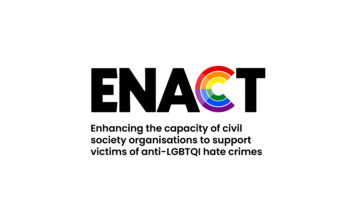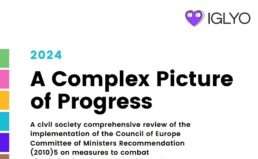New EU-funded study identifies systemic barriers to justice and calls for improved victim support services
A comprehensive six-country study conducted by the ENACT project has uncovered significant challenges facing LGBTIQ+ hate crime victims across Europe, revealing widespread underreporting, institutional distrust, and systemic gaps in support services.
The ENACT project (Enhancing the Capacity of Civil Society Organisations to Support Victims of Anti-LGBTQI Hate Crimes), co-funded by the European Commission under the Citizens, Equality, Rights and Values Program, conducted extensive research across Italy, Lithuania, Spain, Hungary, Slovenia, and Greece throughout 2024. Team of researchers interviewed 149 participants, including 92 hate crime survivors and 57 professionals, to evaluate existing services and identify barriers to justice.
Key Findings by Country:
- Italy (Rete LENFORD): 20 survivors and 20 professionals interviewed revealed that “under-reporting of hate crimes is widespread.” Research showed that many victims are unaware of their rights or unable to claim them due to migrant status, family hierarchies, or economic constraints. The Italian study emphasized that “it is a privilege to be able to stand trial,” highlighting socioeconomic barriers to justice.
- Lithuania (National LGBTI Rights Organization LGL): Research involving 7 survivors, 6 professionals, and a focus group of 6 institutional stakeholders found that none of Lithuania’s 23 victim support services specifically addresses LGBTIQ+ needs. Survivors reported experiencing a systematic failure to receive legally mandated information and support materials in appropriate languages.
- Spain (Universitat de Girona): Analysis of 17 survivors and 23 professionals (16 interviews and 7 focus group participants) demonstrated that victim responsiveness is intrinsically linked to social and economic factors. Professionals stressed the importance of comprehensive accompaniment, specialized training, and effective coordination between support services.
- Hungary (Háttér Society): 12 survivors and 11 professionals participated in the study, with 4 of the survivors identifying as transgender people. Research showed that despite having specific hate crime legislation, the majority of LGBTIQ+ people have little or no trust in the justice system, largely due to government-fueled anti-LGBTIQ+ discourse prevalent in the past five years.
- Slovenia (Peace Institute): 10 survivors and 17 professionals (12 interviews and 5 focus group participants) reported that lack of trust in public institutions, especially the Police, is the main reason for underreporting. Fear of consequences, stigma, and concerns about identity disclosure to family, friends, and coworkers were cited by the majority of survivor respondents.
- Greece (KMOP-Social Action and Innovation Centre): 11 survivors and 12 professionals (7 interviews and 5 focus group participants) identified that despite legal advances including same-sex marriage and adoption legalization, survivors face significant systemic obstacles. None of the survivor participants had reported their incidents to authorities, highlighting profound distrust in institutional responses.
Overall Research Findings:
- Widespread institutional distrust: Across all countries, a significant majority of survivors expressed a lack of confidence in law enforcement and justice systems, with institutional distrust emerging as one of the most consistent themes throughout the research.
- Training deficiencies: Throughout all six countries, professionals consistently emphasized the urgent need for specialized training for law enforcement, judiciary, and healthcare providers, identifying this as a critical priority for improving responses to anti-LGBTIQ+ hate crimes.
- Intersectionality challenges: Research identified that LGBTIQ+ individuals with intersecting identities (migrants, ethnic minorities, transgender people) face compounded barriers to justice and support. Transgender participants in particular reported experiencing severe and persistent forms of institutional discrimination, with multiple countries highlighting their unique vulnerabilities within support systems.
- Civil society as frontline responders: In all six countries, LGBTIQ+ civil society organizations were identified as the primary and most trusted sources of support, often filling gaps left by official institutions.
“The system itself lacks basic humanization; beyond security, one of the fundamental needs is to be seen and treated as a human being,” observed a participant from Lithuania’s Seimas Ombudsperson’s Office, capturing a sentiment echoed across all participating countries.
Next Steps:
Building on these findings, the ENACT project will develop specialized training program for professionals and create practical tools to enhance support for LGBTIQ+ hate crime victims. The project aims to strengthen collaboration between civil society organizations and public institutions to improve reporting mechanisms and victim support services.
The full research reports for each country are available at Zenodo
Contact Information: monika@gay.lt
About ENACT: The ENACT project (Enhancing the Capacity of Civil Society Organisations to Support Victims of Anti-LGBTQI Hate Crimes) is co-funded by the European Commission under the call CERV-2023-CHAR-LITI of the Citizens, Equality, Rights and Values Program. The project is coordinated by Rete Lenford Avvocatura per i diritti LGBTI (Italy) in partnership with organizations from Greece, Hungary, Lithuania, Slovenia, and Spain.





